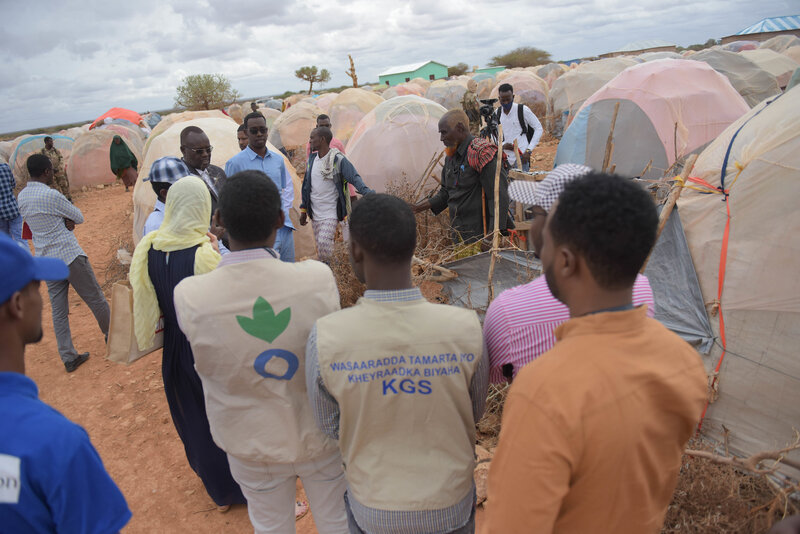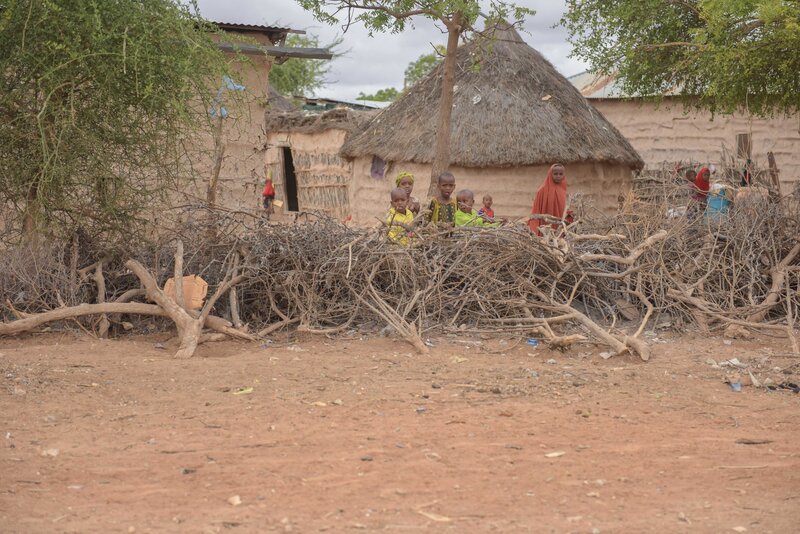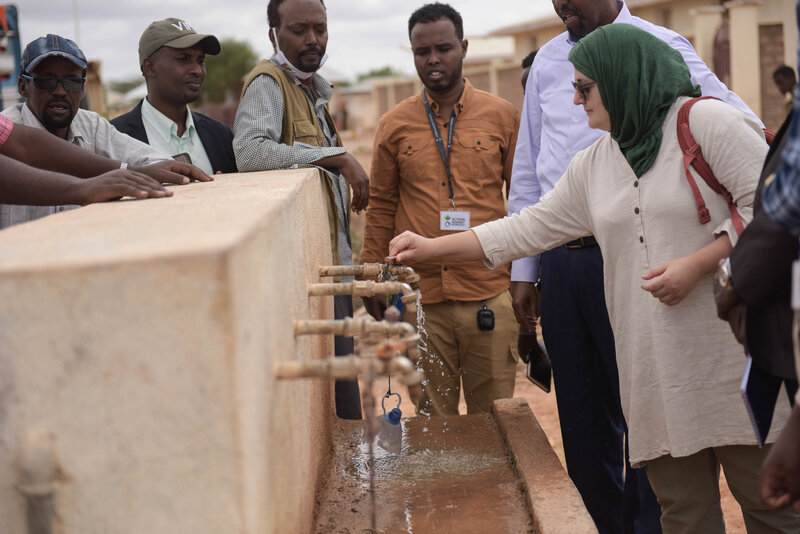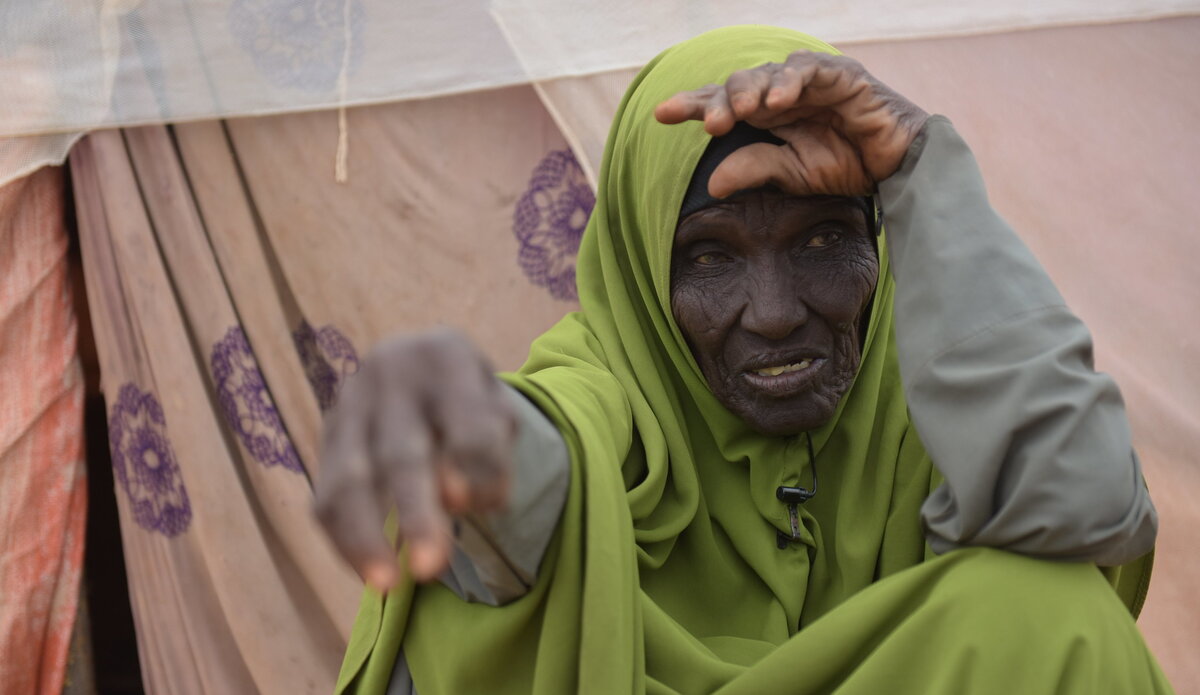Somalia: Hunger and struggle for displaced communities in Besieged Xudur town
Xudur – Seated outside her makeshift home in the Madaxwaarabe internally displaced people’s site in Xudur, 80-year-old mother of five Fatuma Nishow Aliyow does not know where her next meal will come from.
“We have not cooked for the last four days because we have no food to eat. We are starving. We badly need to be supported,” she says.
Three months ago, Al-Shabaab forcefully evicted Fatuma and her family from their home in Moorigaabey village, 30 km northwest of Xudur. Her five children are staying with relatives and she sends most of the monthly financial assistance she receives in the camp to them. Xudur lies approximately 335 km northwest of the capital Mogadishu.
“We fled Al-Shabaab. They chased us, forcing us to seek shelter and support in this camp. We are desperate, starving, and need something to eat,” she added.

A delegation led by the South West State Minister of Humanitarian Affairs and Disaster Management, Abdinasir Arush, and including the Director General of Somalia’s Ministry Humanitarian Affairs and Disaster Management Ahmed Abukar Ahmed, the Xudur District Commissioner, Mohamed Maalim Ahmed, and UN officials recently visited Xudur on a humanitarian assessment mission.
The delegation visited Daleeley, Shiidley and Madahwaraabe sites for internally displaced people (IDPs), a maternal and child health care facility and feeding centre, a water pump station, checked on the progress of ongoing projects and interacted with displaced families.
Fatuma’s situation is compounded by an aid blockade. Al-Shabaab has besieged Xudur and neighbouring towns in Bakool region for the last seven years, cutting off road access for humanitarian assistance to vulnerable populations. According to media reports, on 4 June, the situation escalated when Al-Shabaab killed six traders and torched 11 trucks laden with food aid bound for Xudur. As many as 4,000 people are reported to have arrived in the area since then.
The blockade has caused food prices to surge in Xudur town, further exacerbating the situation of the displaced families who depend on humanitarian assistance. Flying in this life-saving support is currently the only safe way to provide relief, and recently humanitarian partners managed to airlift food and other supplies into the besieged area. As a result, people who urgently needed humanitarian aid were assisted and the price of a bag of rice dropped from US$50-69 to $26.
Displaced people in Xudur receive $70 per family, medical assistance, non-food items and food rations. The money and food are insufficient as more people continue to arrive, thus putting a strain on available assistance.
REQUEST FOR SUPPORT

“My request to the donors is that I am a displaced person who lives here. We depend entirely on humanitarian agencies and God for our survival. We are really suffering. We request food, decent shelter and a school. We need a lot of support,” said 75-year-old Mohamedkheyr Nur, a father of 10 living in Daleeley site for displaced people.
According to Minister Arush, humanitarian response has improved the living conditions of displaced families, though there is a need to scale up interventions. “These displaced people have many challenges. They were forced to flee their homes where they lived for many years and had their livelihood. They now have no proper shelter; there is also little food in the town due to the blockade. Water is also scarce. These basic needs are their biggest challenge,” he noted.
Somalia has one of the highest numbers of displaced people in the world. Some 2.9 million people - nearly 25 per cent of the population - is displaced.
Climate-related shocks have exacerbated the humanitarian situation in the country. For instance, there are 350 internally displaced people’s sites in South West State, making it one of the worst-hit by displacement Federal Member States. Shiidley residents too, echoed this sentiment – even if the security situation improves, the drought has taken their crops and livestock so returning home would bring a different set of challenges. Displaced people face risks of eviction, marginalisation and exclusion, and lack of access to essential services like shelter, water and sanitation.
The humanitarian community has prioritised assistance for 4 million of the most vulnerable people in Somalia in 2021. The 2021 Humanitarian Response Plan seeks $1.09 billion to provide life-saving assistance and livelihood support to those most affected. However, only $432 million (40 per cent) of the required funding is available, the lowest in six years.
Xudur District Commissioner Mohamed Maalim Ahmed said his administration has resettled IDPs and provided safety; but urged for more humanitarian support from international funding partners. “The problem of displacement has been recurring. But what these IDPs here need most is security. They need their safety to be guaranteed, having been forced to leave their homes by conflict. Secondly, they need humanitarian assistance. We appeal to the donors to support them,” he added.
The Strategic Communication and Coordination Officer in the UN Office for the Coordination of Humanitarian Affairs, Olga Cherevko, said the situation could worsen if additional resources are not mobilised soon. “The already existing gaps could increase because more people fleeing conflict and drought are arriving on a daily basis,” Cherevko noted.

 UN
UN





